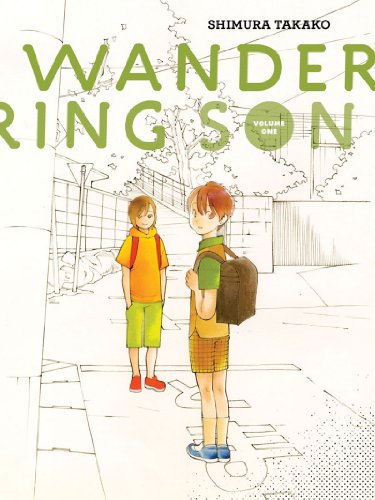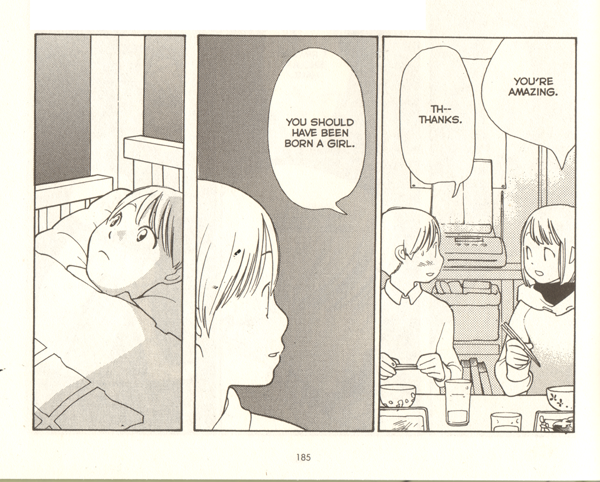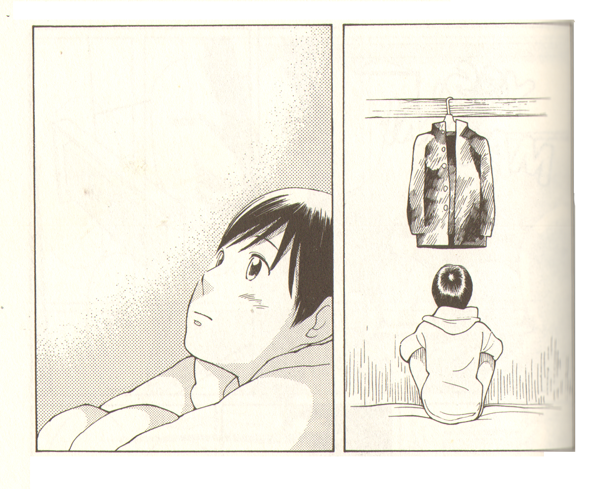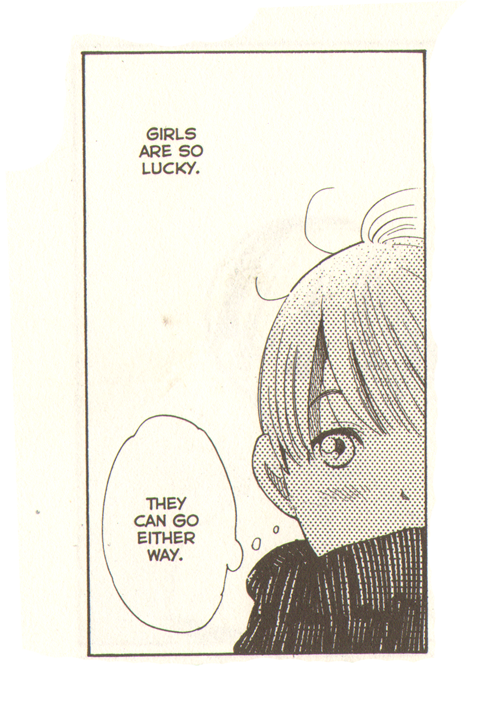A little boy is mistaken for his older sister and is bewildered by the feeling that this stirs in him. Thus begins the story of the Wandering Son, a daring fairy-tale about two unusual children in the time before the riot of puberty and their struggles with who they are and who they want to be. The series’ author, Shimura Takako won acclaim for the naturalistic sensivitity of her groundbreaking yuri title Aoi Hana, which depicts young women who consciously and confidently identify as lesbian. Wandering Son, which runs in the alternative manga magazine Comics Beam in Japan and is published for the first time in English by Fantagraphics, follows the ordinary lives of kids who as they grow up do not find their biologically assigned sex to be a perfect fit.
Shuichi Nitori is a shy and gentle-hearted fifth grader who loves to bake, write plays and looks just like a girl. His “cute” attributes almost take on the quality of a spell that protects Shuichi in the period of his life before his boy’s body begins to betray him. Adults and peers alike are enchanted by his natural androgyny. To a point. His dry-witted mom is entertained by a lark in a girl’s sailor-suit school uniform, but abruptly has to remind Shuichi to quit staring at it hung on his door. His fascination eventually crosses a boundary in her mind.
He tests the boundaries of the spell further when his classmate Saori Chiba, an old soul prone to impenetrable melancholy takes to a fascination with dressing Shuu up in girls’ clothes. When his older sister catches them, the sight repulses her.
His friend Takatsuki Yoshino is more sure-footed in her wish to be a boy. She brushes off her parents’ repeated attempts to buy her dresses. Instead she is a tomboy who dresses in jeans and loose-fitting hoodie sweatshirts. Direct and specific, she takes a small-time bully in hand with astonishing ruthlessness but is transparently crushed by her oncoming adolescence which makes itself cruelly visible every month.
Takatsuki introduces Shuichi to her hobby of traveling to distant parts of town where no one will recognize them in drag. They sit in the sun, browse shops and eat hamburgers as approximations of their ideal selves, and are exhilarated by the ordinary. Everyday objects, a hairband, a handed down school uniform, a barrette, that blend Shuu and Takatsuki with their desired selves take on a mystical importance as totems of their transformed selves. An ordinary haircut together is a riveting experience imbued with supernatural power, one of the few small choices allowed them to channel their inner desires to the outside world without attracting undue suspicion.
The artwork in Wandering Son is appealing and sensitive. Negative space employed around close-ups of the characters’ faces is pregnant with consideration, doubt, hesitation, epiphany. Shimura allows us to follow snatches of overheard conversation through scenes that flow into one another as if in a dream, perhaps an adult’s remembrance of childhood with great revelations interwoven through the banal maneuvers of the classroom or the family dinner or an argument with a sibling. Sparse sections rendered in delicate watercolor are light and airy, while dream sequences are rendered with an apprehensive black background, the eternal possibility of humiliation and ostrasization underscoring the fantasy of the ideal self.
Japanese culture has experienced a different arc from my own, with various examples of gender nonconformity at all levels of society. The difficulties of a contemporary Japanese trans-kid are likely not an exact mirror to their counterparts in America, where a strict bianary is rigorously enforced with humiliation and often violence. Reading about the lives of Japanese kids in the context of my (still shamefully limited) understanding of gender-queering in American culture raises plenty of questions. Wandering Son mercifully isn’t a political screed and its characters, equally mercifully, are not pressured into making political points out of their inner lives. As they grow, Shuichi and Takatsuki adapt to new clothing styles. Their hair is left to grow and is cut short and restrained as often. Their emerging affections have little to do with “straight” or “gay” and they experience tremendous self-doubt as their fast-approaching secondary sex characteristics begin to underline the limitations of their dressing up and playing the part of who they want to be. They are allowed under a protective charm to explore their feelings and identity and are treated with the utmost compassion and dignity by their author.
That makes Wandering Son a most compelling fantasy, one in which the gentle-hearted are protected by their friends and youths hold the key to wisdom and self-knowledge in the form of a headband Would that every profoundly different kid were granted the same freedom and gentleness by society that pushes them in conflicting directions. Even this first volume, which focuses on the most flexible time in a kid’s life, is keenly aware of the unfairness of this system, which looms over a sissy or a tomboy like a distant god’s arbitrary cruelty. Wandering Son chooses for the most part to dwell on the possibility of choice, of self-knowledge and the love of a friend who knows your secret.
Michael Arthur is the author of Go Ye Dogs! In the interest of full disclosure, he is a former Fantagraphics editorial intern.





